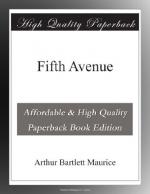“In New York, where there were five farewell nights, $3,298 were the receipts of the last, on the 20th. of April; those of the last at Boston, on the eighth, having been $3,456. But, on earlier nights in the same cities respectively, these sums also had been reached; and indeed, making allowance for an exceptional night here and there, the receipts varied so wonderfully little, that a mention of the highest average returns from other places will give no exaggerated impression of the ordinary receipts throughout. Excluding fractions of dollars, the lowest were New Bedford ($1,640), Rochester ($1,906), Springfield ($1,970), and Providence ($2,140). Albany and Worcester averaged something less than $2,400; while Hartford, Buffalo, Baltimore, Syracuse, New Haven, and Portland rose to $2,600. Washington’s last night was $2,610, no night there having less than $2,500. Philadelphia exceeded Washington by $300, and Brooklyn went ahead of Philadelphia by $200. The amount taken at the four Brooklyn readings was $11,128.”
And only a few years ago there were Americans deploring loudly the shabby financial treatment we gave Dickens, and figuratively and literally passing round the hat!
Fifth Avenue’s greeting to Charles Dickens, on the occasion of his second visit, was in the form of the dinner that was tendered to him at Delmonico’s, on the evening of April 18, 1868. The hosts were two hundred men of the New York press. Covers were laid for a hundred and eighty-seven guests.
Five o’clock was the time appointed—we were a rugged, early-dining race in those days—but the guest had a slight stroke of illness and did not appear until after six. Then it was a limping old man, aged just sixty-six, who, by the aid of a cane, climbed laboriously up the great staircase. He was led to his seat at the table by Horace Greeley, and seated between Mr. Greeley and Henry J. Raymond. The editor of the “Tribune,” acting as master of ceremonies, began the speech-making by referring to his first discovery, many years before, of a story by the then unknown “Boz.”
In concluding his reply to the toast, Mr. Dickens promised: “manfully, promptly, and plainly in my own person, to bear for the behalf of my own countrymen such testimony of the gigantic changes in this country as I have hinted at here tonight. Also to record that wherever I have been, in the smallest place equally with the largest, I have been received with unsurpassed politeness, delicacy, sweet-temper, and consideration.... This testimony, so long as I live, and so long as my descendants have any legal right in my books, I shall cause to be republished, as an appendix to every copy of those two books of mine in which I have referred to America. And this I will do and cause to be done, not in mere love and thankfulness, but because I regard it as an act of plain justice and honour.”
The amende honorable was not less welcome for being long due and the distinguished visitor sat down to loud applause and the strains of “God Save the Queen.” Mr. Raymond responded to the toast “The New York Press,” and was followed by George William Curtis, William Henry Hurlbert, Charles Eliot Norton, Joseph R. Hawley, Murat Halstead, Edwin de Leon, and E.L. Youmans.




